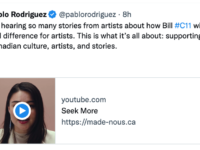Canadian Heritage Minister Pablo Rodriguez’s credibility took another hit yesterday with an exceptionally misleading tweet on Bill C-11. The tweet featured a video of artists encouraging Canadians to seek out Canadian content, which Rodriguez used to tweet “I’m hearing so many stories from artists about how Bill #C11 will make a real difference for artists. This is what it’s all about: supporting diverse Canadian culture, artists, and stories.” Leaving aside the fact that thousands of digital creators have vocally opposed the bill with warnings that it will result in serious harm to their careers and livelihood, the artists in the video were not speaking about Bill C-11. We know that because the video was launched in April 2021, pre-dating Bill C-11 by nearly a year and created before the government started the ruckus by removing Section 4.1 protections for user content from Bill C-10.
Search Results for "c-18" : 195
Canadian Heritage Minister Pablo Rodriguez’s Credibility Problem, Part One: The Laith Marouf/CMAC Issue
Canadian Heritage Minister Pablo Rodriguez appeared before the Standing Committee on Canadian Heritage on Friday for one hour and walked away with a serious credibility problem. Rodriguez has already been repeatedly contradicted on Bill C-11, claiming that the bill doesn’t cover user content or algorithms. On both issues, the CRTC Chair (and virtually every expert) say otherwise. Friday’s hearing focused on two issues – the Laith Marouf/CMAC issue of government funding for an anti-semite and Bill C-18, the Online News Act. Given his responses to MP questions, Rodriguez now faces credibility questions on both. This post will focus on his responses to questions about Canadian Heritage funding for CMAC/Marouf and a second post tomorrow will examine his misleading statements on the bill.
Survey Says: Why the Government Reacted With Alarm to a Critical Opinion Poll on the Online News Act
On the very first day of the Standing Committee on Canadian Heritage’s hearings on the Online News Act last month, News Media Canada, the lead lobbyist for Bill C-18, was asked about a poll it commissioned this year which found 79% support requiring Google and Facebook to share revenue with Canadian news outlets. When Bloc MP Martin Champoux asked whether respondents were well informed, President and CEO Paul Deegen assured him “they were very well informed”. Deegan had a different response yesterday to another poll – this one commissioned by Google – as he took issue with the poll and warned that Google must provide “an honest presentation of the facts.” I have never thought any of these corporate-commissioned polls were of significant value and I’m not going to start now, whether it is News Media Canada or Google that is doing the commissioning. However, I think what makes the Google poll notable is the response to it, rather than the actual data.
The House of Commons Committee Process is Broken
Over the past year, I have watched an unhealthy amount of House of Commons and Senate committee hearings. In fact, in recent months I may have watched more of the Standing Committee on Canadian Heritage than Netflix, given hearings on Bill C-11, C-18, and the Laith Marouf issue. Having watched many hours – and appeared multiple times before that committee and others – it is time to declare the system broken. I’m not sure I have answers, but the starting point may be recognizing that Canadians are not being well served and there is plenty of blame to go around.
The impetus for this post is Friday’s hearing on the Laith Marouf incident. The problems started even before the hearing as the committee voted against asking Canadian Heritage Minister Pablo Rodriguez to appear as part of the study, with some MPs saying they would take a wait-and-see approach. But if government is to be accountable for the disastrous failure for using an anti-hate program to fund an anti-semite, committee testimony should not be something to avoid.
Why the Online News Act is a Bad Solution to a Real Problem, Part Six: CBC Eligibility Harms News Competition and Its Public Interest Mandate
The blog series on why Bill C-18, the Online News Act, is a bad solution to a real problem continues with the first of several posts on the eligibility rules, starting with the decision to make the CBC eligible for the system that could lead to mandated payments. The inclusion of the public broadcaster should be opposed by its critics and supporters since it harms both competition and the public interest role of the public broadcaster. Indeed, critics will rightly note the market distortion it creates for private entities who stand to lose further advertising-related revenues to the CBC, while supporters should be concerned that the bill undermines the CBC’s claim to a public interest role and makes an ad-free version of the service even less likely. [Previous posts in the series: the risk to the free flow of information stemming from mandatory compensation for linking, how the bill encourages clickbait and other low quality news given the absence of standards in the definition of “news content”, the unprecedented government intervention in a sector where independence is essential, how the bill undermines Canadian copyright law and Canada’s international copyright law obligations, and a Law Bytes podcast episode based on my appearance before the Standing Committee on Canadian Heritage.]











